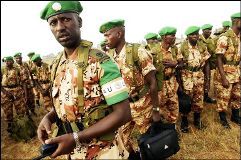UN wants stronger mandate for AU monitors in Darfur
By Opheera McDoom
KHARTOUM, Sept 8 (Reuters) – African Union monitors of a shaky ceasefire in Sudan’s remote Darfur region should have an expanded mandate but stop short of peacekeeping, a United Nations official in Sudan said on Wednesday.
 “We are not actually talking about peacekeeping at this stage. We are talking about the same arrangement that is already there to be expanded with a stronger mandate,” Radhia Achouri, spokesperson for the U.N. Advance Mission in Sudan (UNAMIS), told reporters in Khartoum.
“We are not actually talking about peacekeeping at this stage. We are talking about the same arrangement that is already there to be expanded with a stronger mandate,” Radhia Achouri, spokesperson for the U.N. Advance Mission in Sudan (UNAMIS), told reporters in Khartoum.
“We want a mandate that allows the AU to be more proactive, to be present on the ground, to have offices, to be everywhere where it should be in all areas,” she added.
Sudan has said it would accept more AU monitors but not if their mandate was expanded.
More than 100 AU observers with just over 300 AU troops to protect them are deployed in Darfur to monitor a humanitarian ceasefire agreed in April between African rebels, who launched a revolt in February 2003, and the government.
Both sides accuse the other of violating the ceasefire and the AU has offered to send more troops to act as peacekeepers.
U.N. Secretary-General Kofi Annan has said he wants an increased international presence in Darfur, and that he was not satisfied with Sudan’s progress towards securing its vast western region.
“There is an urgent need from our point of view to increase the monitoring capacity of the African Union,” Achouri said on Wednesday. “We are not talking only about the number of African Union monitors to be deployed, but we are also talking about a more robust mandate,” she said.
KHARTOUM DISPUTES DEATH TOLL
After years of low-level conflict between Arab nomads and African farmers over scarce resources in arid Darfur, African rebels took up arms, accusing the government of supporting Arab militias, known as Janjaweed, to loot and burn African villages.
Khartoum admits arming some militias to combat the rebels, but denies any links to the Janjaweed, calling them outlaws. The U.N. says the fighting has forced more than 1 million to flee their homes, with 200,000 refugees in neighbouring Chad, sparking one of the world’s worst humanitarian crises.
The United Nations says up to 50,000 people have been killed. But in Tokyo on Wednesday, Sudanese Foreign Minister Mustafa Osman Ismail said that figure was greatly inflated.
He said the “tribal conflict” in Darfur had killed no more than 5,000 people.
The United Nations also said on Wednesday there had been an influx of people fleeing violence in South Darfur, where a displaced population in one area south of the capital Nyala of 12,000 had risen to 30,000 this week.
Ismail said the government was doing what it could to disarm the Janjaweed, but unless the rebels also disarmed, the conflict could not be settled.
AU-sponsored peace talks between the rebels and the government in Nigeria’s capital, Abuja, have all but stalled on the security issues, including disarmament.
In an effort to revive the talks, AU negotiators tabled a watered-down security blueprint that drops proposals for the rebels to confine their troops to base and does not address the key rebel demand for the Janjaweed to be disarmed.
“What is now on the table is quite sufficient for reaching a compromise,” said Najib Abdulwahab, Sudanese minister of state for foreign affairs, at the talks.
Rebels said they were happy with the concession on the confinement of their troops but still wanted to negotiate further on those issues that had disappeared from the watered-down document.
(Additional reporting by George Nishiyama in Tokyo)
